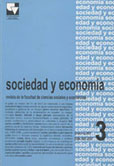Modelo de ajuste estructural en Argentina: economía y política de un fracaso
Main Article Content
This paper presents a balance of the results obtained through prescriptions of
structural adjustment that were applied in Argentina during the 1990´s. The inability of the new economic orientation for solving the structural problems of the foreign debt is underlined, since it has brought an increased impairment of the productive capacity of the country, with negative effects on the social arena. A call is made to rescue the ethical criteria that ought to be at the conceptual and argumentative basis of those in charge of the economic policy. These, inspired in the recipies of the Washington Consensus, sacralized the market up to the point of making it a substitute of the institutional order of the State, with the ensuing social negative impact, and made of the borrowing capacity of the country the main target of the economic policy.
structural adjustment that were applied in Argentina during the 1990´s. The inability of the new economic orientation for solving the structural problems of the foreign debt is underlined, since it has brought an increased impairment of the productive capacity of the country, with negative effects on the social arena. A call is made to rescue the ethical criteria that ought to be at the conceptual and argumentative basis of those in charge of the economic policy. These, inspired in the recipies of the Washington Consensus, sacralized the market up to the point of making it a substitute of the institutional order of the State, with the ensuing social negative impact, and made of the borrowing capacity of the country the main target of the economic policy.
Escobar , J. H. (2002). Modelo de ajuste estructural en Argentina: economía y política de un fracaso. Sociedad Y Economía, (3), 35–54. https://doi.org/10.25100/sye.v0i3.4196
Similar Articles
- Jorge Mario Uribe Gil, Stephanía Mosquera López, Natalia Restrepo López, Colombian Stock Market. Macroeconomic Determinants and the Role of the AFP , Sociedad y Economía: No. 24 (2013): Estudios de Género y Sexualidad
- Oscar Fresneda Bautista, Evolution of the social classes’ structure in Colombia, 1938-2010. Have the middle classes grown? , Sociedad y Economía: No. 33 (2017): Número 33 (Julio - Diciembre 2017): Ciudades y regiones en un mundo de elevada complejidad
- Carlos José Suárez García, Stigma, Communitas and Corrective Ways to Homeless People in Bogotá (2000-2010) , Sociedad y Economía: No. 32 (2017): Número 32 (Enero - Junio 2017): Violencia urbana
- Camilo Bácares Jara, Types and Reasons of Appearance of Public Policy for Children in Colombia 1930-2012 , Sociedad y Economía: No. 26 (2014): La gestión de lo social y las formas de intervención en las sociedades de los siglos XX y XXI
- Alida Chaparro Barrera, Culture of peace from the classroom. A meeting between Potter and Freire , Sociedad y Economía: No. 35 (2018): Número 35 (Julio - Diciembre 2018)
You may also start an advanced similarity search for this article.

This work is licensed under a Creative Commons Attribution-NonCommercial 4.0 International License.
Revista sociedad y economía editada por la Facultad de Ciencias Sociales y Económicas de la Universidad del Valle se encuentra bajo una Licencia Internacional Creative Commons Atribución - No comercial 4.0
Basada en una obra en http://sociedadyeconomia.univalle.edu.co





